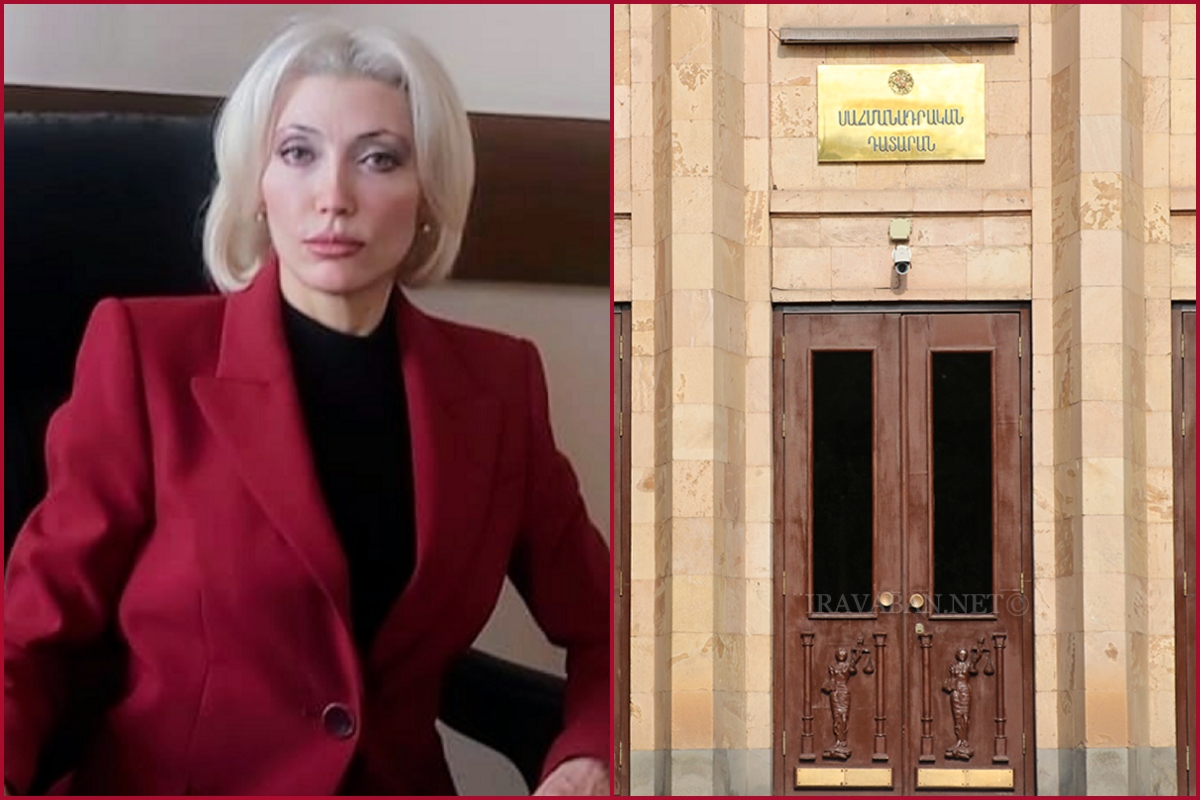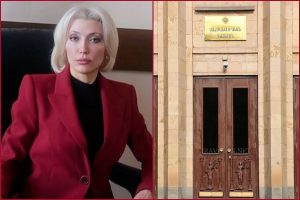On July 16, 2024, the Supreme Judicial Council decided to terminate Judge Anna Danibekyan’s powers.
Let us recall that on February 10, a video was published on the Supreme Judicial Council’s official page, where the Council’s staff accused judges of delaying the cases of Robert Kocharyan, Serzh Sargsyan, Levon Yeranosyan, Gagik Khachatryan, and Manvel Grigoryan. The Department urged the prosecuting bodies, including the executive authority, to consider the video for initiating disciplinary proceedings.
According to Iravaban.net, on January 20, 2025, Danibekyan appealed to the Constitutional Court, requesting to declare the provisions regarding significant disciplinary violations in the Judicial Code as unconstitutional and invalid.
Note that according to the Code, a significant disciplinary violation is:
1) committing a disciplinary violation by a judge who has received two reprimands or one severe reprimand, or
2) committing an act by a judge that is incompatible with the position of a judge.
Additionally, the appellant requested to declare the regulations regarding disciplinary proceedings against judges as contradicting the Constitution and invalid, as well as Article 153, Part 3 of the Code: “In case of a judge’s unjustified absence after being summoned by the Supreme Judicial Council, the Council is authorized to examine the matter of subjecting the judge to disciplinary liability in the judge’s absence.”
According to Danibekyan, the concepts of significant disciplinary violations enshrined in the Judicial Code do not meet the criterion of legal predictability and, due to insufficient clarity, do not allow for clear distinction between the aforementioned “significant” disciplinary violations and other disciplinary violations specified in other paragraphs of the same article, giving the law enforcer too broad discretionary freedom in interpreting and applying these terms.
Addressing the circumstances serving as the basis for distinguishing between “ordinary” and “significant” disciplinary violations, the appellant believes that in Part 6, Paragraph 1 of the aforementioned article, the consequence of the disciplinary violation is viewed as such, whereas in practice, these consequences inevitably accompany any obvious and gross violation of substantive or procedural law norms. According to the appellant, it is difficult to imagine how any obvious and gross violation of substantive or procedural law could not lead to a violation of the parties’ right to a fair trial or not discredit the judicial authority. The appellant maintains that the obvious and gross nature of such a violation inherently contains the inevitability of these consequences.
The appellant notes that in the Supreme Judicial Council’s decision regarding Judge Vahe Misakyan, the latter was attributed with “violation of the victim’s right to a fair, public trial within a reasonable time by an independent and impartial court” as well as “discrediting the judicial authority.” That is, according to Danibekyan, in the case of a violation qualified as “ordinary” disciplinary violation, the consequences described in the code as characteristics of a “significant” disciplinary violation were directly recorded – in other words, all those circumstances. At the same time, according to the appellant, the same circumstances recorded in the Supreme Judicial Council’s decision on her case (violation of the right to trial within reasonable time and discrediting the judicial authority) served as the basis for qualifying the disciplinary violation as “significant” and applying the most severe disciplinary sanction.
Anna Danibekyan also noted that the video prepared by the Council’s staff and published on their official accounts was artificially adapted to regulations regarding grounds for initiating disciplinary proceedings, where material published in the press is specified as grounds for initiating disciplinary proceedings.
“It is noteworthy that material published in an official source of a state authority body is not included in the list of such grounds, which implies that there were no legal grounds for initiating disciplinary proceedings. Therefore, to give legitimacy to the subsequent disciplinary proceedings, the original source of the video was disguised through republication in the press,” stated Danibekyan.
The appellant also believes that in case of a judge’s non-appearance at the Supreme Judicial Council session, the reasons for their absence and questions regarding whether these reasons are justified or unjustified should be subject to discussion. In this regard, the former judge emphasizes that the Council’s authority to examine the matter of disciplinary liability in the judge’s absence is discretionary, which implies that even if the judge’s absence is deemed unjustified, after recording this circumstance, the appropriateness of continuing the court session in the judge’s absence should be discussed, taking into account the specific circumstances of the case.
“The Council has interpreted Part 3 of Article 153 of the Judicial Code in such a way that the absence of a notified judge mechanically leads to continuing the court session in their absence, regardless of the reasons for the judge’s absence and other circumstances, which interpretation neutralizes the adversarial nature of the disciplinary proceedings,” Anna Danibekyan stated in her appeal.
The Constitutional Court noted that it may make a procedural decision to reject the case examination in whole or in part if the questions raised in the application are not subject to the Constitutional Court.
“In all cases where the appellant, while formally challenging the constitutionality of a legal provision, essentially raises the question of the legitimacy of applying that provision or pursues other objectives, such applications are subject to rejection as applications not raising questions subject to Constitutional Court examination…. Taking into account the positions and justifications presented by the appellant, the Constitutional Court’s judicial panel finds that the questions raised by the latter are not subject to Constitutional Court examination,” states the judicial panel’s decision on the application, which includes Hovakim Hovakimyan, Vahe Grigoryan, and David Khachaturyan.
The Court noted that in this application, Anna Danibekyan expresses her disagreement with the content of the decision to terminate her powers, but does not present any substantiated argument of unconstitutionality: “Checking the legitimacy of the mentioned decision is beyond the scope of the Constitutional Court’s jurisdiction.”
The judicial panel decided to reject the examination of the case based on Anna Danibekyan’s individual application.
Yevgenya Hambardzumyan
















